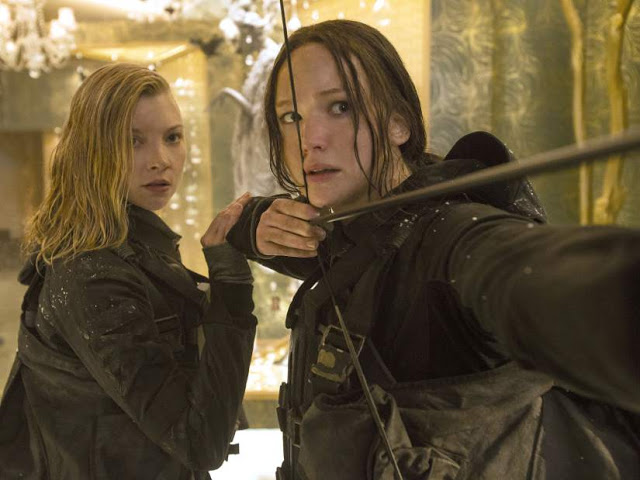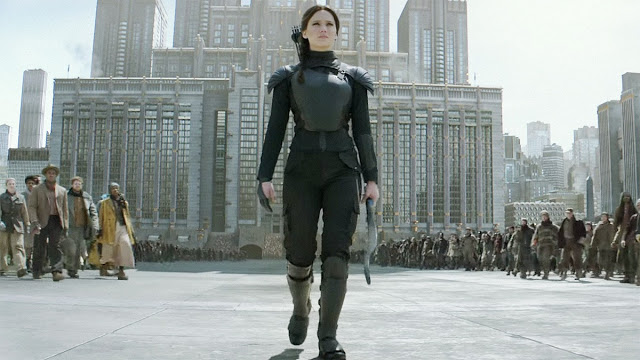The Hunger Games is a franchise about progress. It chronicles a revolution, in which the effectively enslaved rise up against the ruling class, striving to topple a ruthless system of oppression and install a more democratic form of government. It is bitterly ironic, then, that each successive movie in the series has been progressively worse than its predecessor. The original Hunger Games, based on the first of Suzanne Collins’s three taut novels, was a bracing dystopian drama, hypnotically terrifying in its assured depiction of a society that used children for blood sport. It was a feat that the first sequel, Catching Fire, largely repeated—it lacked the initial installment’s spark but compensated with craft. The third movie, continuing an artistically dubious but commercially inviolable studio practice, covered roughly half of Collins’s final book, Mockingjay; it struggled to infuse energy into relatively lifeless material, but it nevertheless had its virtues, with strong performances from a phenomenal cast and an electric final 20 minutes.
And now we’ve come to the end with Mockingjay, Part 2, which ought to bring the franchise to a bold and powerful conclusion. Instead, this fourth and final film feels woefully inert, not only lacking in excitement and intrigue, but also missing the reliable filmmaking competence that suffused the prior entries. It’s as if the director, Francis Lawrence, who has helmed each of the three sequels (the original was made by the enigmatic Gary Ross), simply became too exhausted with the labor of transmuting Collins’s terse prose into moving pictures. The most damning thing about Mockingjay 2 isn’t that it’s bad—it’s that it feels so tired. The franchise may have its faults, but it galvanized a legion of teenagers with its punchy themes and robust storytelling. It deserved better than to go out with such a pitiful whimper.
If I take issue with the ending of Mockingjay 2, I can’t quarrel with its beginning, as it doesn’t really have one. This is one of the few benefits of the bifurcated approach—because the first half of the movie has already taken place, Lawrence is liberated from the typical requirement of exposition and can immediately get down to business. In this case, that involves considering the reaction of Katniss Everdeen (Jennifer Lawrence, still hard at work), who is in turn stymied by the behavior of Peeta (Josh Hutcherson), her sorta lover who is now obsessed with killing her. Peeta spent most of Part 1 locked up in the Capitol, the embodiment of autocratic rule; although he was eventually rescued and brought to District 13, the center of the rebellion, his mind appears to have been reprogrammed. Where he once looked at Katniss with adoration, now his eyes show only hatred.
At least, that’s the idea; the execution is another matter. Mockingjay 2 has plenty of problems—sluggish pacing, sloppy writing, anemic action—but its most crippling flaw is its bungling of Peeta. The theory is that he is a constant threat, a sleeper agent at war with himself. Yet Lawrence never comes close to articulating Peeta’s perpetual struggle. For most of the movie, he seems like his normal decent self, only to occasionally say something really mean or do something really dangerous. This may make him unpredictable, but it doesn’t render him interesting, just random. For the central conflict of Mockingjay 2 to work, we need to be able to discern Peeta’s emotional turmoil, even when the character himself is confounded. Instead, we’re stuck watching an intermittently homicidal mope. Hutcherson is a fine actor, but he can’t hope to convey Peeta’s inner torment when Lawrence fails to understand it himself.
An unintended benefit of this failure is that it minimizes the focus on the franchise’s dual romances, one between Katniss and Peeta, the other between her and Gale (Liam Hemsworth, hopeless). It is one of fiction’s limper love triangles; Peeta may have his issues, but Gale is a gigantic bore, an ostensible male mirror of Katniss’s fiery rage who mostly just sulks and skulks. This complete absence of romantic friction frees Lawrence up to focus more on pushing the plot forward. That’s good in theory, but Mockingjay 2 is weirdly lacking in momentum. After receiving instructions from the rebellion’s leader, Alma Coin (a very good Julianne Moore), Katniss finds herself serving in a non-combat unit in the insurgents’ invasion of the Capitol. Rather than battling on the frontlines, this squad’s mission is propaganda. They’re accompanied by a camera crew and a sharp-eyed director (Game of Thrones‘ Natalie Dormer, wasted), and their goal is to capture fake war footage that they’ll use to incite others into a revolutionary fervor.
Like most of Mockingjay 2, this is an intriguing idea that goes nowhere. There is certainly a discussion to be had about the politics of warfare, of the cost of sending soldiers to die for a cause. But while the novel grapples with this concept, adding resonance to a fairly thin story, the movie simply feints at it, then moves on. Similarly, the film never satisfactorily delves into the shadowy nature of Coin’s strategy; as a result, a climactic scene, however nicely staged, is robbed of its purported power. It is odd that such a scrupulously faithful rendering of Collins’s book (the screenplay is by Peter Craig and Danny Strong) fails to capture its most interesting elements.
About that faithfulness: It’s tempting to blame Mockingjay 2‘s inadequacies on the shortcomings of Collins’s novel, or on the filmmakers’ slavish adherence to their source. But the prior film adaptations in the Hunger Games franchise all exhibited similar fidelity to the books, and they still worked as accomplished movies. Here, however, Lawrence’s direction feels stiff, and you get the sense that you’re simply watching well-paid professionals playact their way through a generously budgeted stage production. Some of the special effects are surprisingly poor—a scene in which the characters flee from encroaching oil is laughable—while the lighting is often too dark to properly clarify the action. Even the movie’s most vigorous sequence, an underground battle against frenzied monsters (reminiscent of the nocturnal mutants from Lawrence’s I Am Legend), suffers from frenetic camerawork and murky confusion. As fate would have it, the film’s most lasting image is accidental in its impact: At one point, the camera depicts a crush of refugees descending en masse upon a grand white house, seeking succor.
That’s unfortunate timing, but any allegory (or lack thereof) in the Hunger Games franchise is beside the point. It’s a series that’s primarily designed to furnish sturdy, well-crafted entertainment, and if it makes you reflect on society’s ills, all the better. That’s why the greatest disappointment of Mockingjay 2 is the overall flatness of the acting. The first three films all boasted excellent supporting performances, from Stanley Tucci’s smarmy TV celebrity to Jena Malone’s spiky victor to Elizabeth Banks’s secretly sad airhead. Each of those actors returns for a cameo in this installment, but none makes an impression. (Nor, sadly, does Philip Seymour Hoffman in his final screen appearance; bitterly, the film generates its sharpest sting when you realize that Woody Harrelson (also wasted) is literally reading lines clearly meant for Hoffman’s character.) Indeed, with the exceptions of Moore, Sam Claflin (as a trident-wielding warrior), and newcomer Michelle Forbes (as a rugged lieutenant), the supremely talented cast struggles to communicate their characters’ intelligence, their desires, and their fears. Even Jennifer Lawrence, the franchise’s unshakable pillar, seems tired this time out, perhaps weary from lugging that bow-and-arrow around for so long.
Throughout the Hunger Games, Katniss Everdeen is referred to as “the girl on fire”. It’s an evocative tagline, one that the first film brought to dazzling visual life. But there is no heat to Mockingjay 2, no sense that it is doing anything beyond dutifully serving the fans that transformed this modest franchise into a box-office sensation. There have undoubtedly been worse movies released this year, but maybe none that feel quite so deflating. The final Hunger Games film isn’t on fire. It’s just a few dully glowing embers, waiting to be mercifully snuffed out.
Jeremy Beck is the editor-in-chief of MovieManifesto. He watches more movies and television than he probably should.



